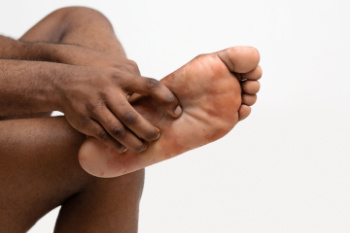

Plantar fasciitis affects millions of people every year. This condition occurs when the plantar fascia, a thick band of tissue that supports the arch of the foot, becomes inflamed due to repeated stress. Symptoms of plantar fasciitis typically include sharp pain in the heel or arch, particularly after periods of rest or first thing in the morning. Swelling and tightness in the Achilles tendon may also accompany this pain, which often worsens after prolonged activity or standing in shoes that lack proper support. Risk factors for developing plantar fasciitis include spending long hours on your feet, engaging in high-impact activities, wearing poorly supportive footwear, and having flat feet or high arches. A podiatrist can recommend correct footwear, exercises, and custom orthotics to alleviate pain. If you are experiencing heel pain from plantar fasciitis, it is suggested that you schedule an appointment with a podiatrist for a diagnosis and treatment.
Plantar fasciitis is a common foot condition that is often caused by a strain injury. If you are experiencing heel pain or symptoms of plantar fasciitis, contact Dr. Edward D. Hutson from Easton, PA. . Our doctor can provide the care you need to keep you pain-free and on your feet.
What Is Plantar Fasciitis?
Plantar fasciitis is one of the most common causes of heel pain. The plantar fascia is a ligament that connects your heel to the front of your foot. When this ligament becomes inflamed, plantar fasciitis is the result. If you have plantar fasciitis you will have a stabbing pain that usually occurs with your first steps in the morning. As the day progresses and you walk around more, this pain will start to disappear, but it will return after long periods of standing or sitting.
What Causes Plantar Fasciitis?
There are some risk factors that may make you more likely to develop plantar fasciitis compared to others. The condition most commonly affects adults between the ages of 40 and 60. It also tends to affect people who are obese because the extra pounds result in extra stress being placed on the plantar fascia.
Prevention
There are a variety of treatment options available for plantar fasciitis along with the pain that accompanies it. Additionally, physical therapy is a very important component in the treatment process. It is important that you meet with your podiatrist to determine which treatment option is best for you.
If you have any questions, please feel free to contact our offices located in Easton, and Northampton, PA . We offer the newest diagnostic and treatment technologies for all your foot care needs.